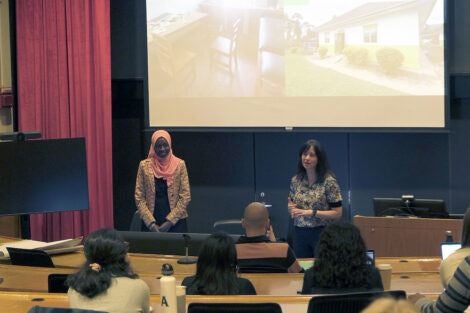December 14, 2022 – Over the summer, eight students from Harvard T.H. Chan School of Public Health partnered with organizations and community members from Boston to Nairobi, Kenya to learn about and help address locally identified public health problems. The students—members of the Spring 2022 cohort of Community Engaged Learning Fellows—spoke about their work at a December 6 event at the School.
The students’ projects included working with a Boston health collaborative, a clinic in Uganda, and cobalt miners in the Democratic Republic of Congo, among others. A common thread across the students’ presentations was their effort to draw on community knowledge to develop creative solutions together.
Jen Cruz, PhD ’26, partnered with the Allston Brighton Health Collaborative (ABHC), a public health nonprofit that convenes organizations, health advocates, elected officials, and residents to improve the systems that impact health and wellbeing in Boston’s Allston and Brighton neighborhoods.
Before she worked with ABHC on her fellowship project, Cruz—an Allston resident herself—volunteered for the Collaborative’s vaccine clinic. Since then, she has supported ABHC by serving on its mental wellness and transportation working committees, and plans to join the advisory board in 2023.
In her committee work, Cruz became aware that some of her fellow volunteers were reticent about advocating for their own priorities regarding the Collaborative’s decision-making about programs and policies for marginalized and under-resourced community members. Instead, they sometimes would ask Cruz to speak on their behalf in the hope that her public health expertise would strengthen their input.
“You shouldn’t have to have an MPH or degree in public health to contribute to the conversation, understand what the news is telling you, and make informed decisions about your health,” Cruz said. So, for her fellowship project, Cruz helped develop an educational program aimed at engaging community members as leaders in ABHC’s work.
Erin McGuinness, DrPH ’24, and Yacine Fall, SM ’23—the inaugural recipients of the Global Mental Health Fellowship, which offers students opportunities to partner with organizations outside the U.S. to address mental health issues in their communities—spoke about their work collaborating with the John Cleaver Kelly Clinic in Kabale, Uganda. They worked with the clinic on evaluating its community mental health outreach, including understanding the perspective of community health workers, patients, and families.
Alina Bhojani, SM ’23, and Alya Al Sager, SM ’23, discussed their experience working with Kidogo, a Kenya-based social enterprise building an expanding network of childcare centers in Nairobi’s urban slums. Kidogo supports female entrepreneurs—who they call “Mamapreneurs”—in starting childcare businesses in their own communities. Al Sager and Bhojani worked with Kidogo to tailor its early childhood development program so that Mamapreneurs would be more likely to use it in their centers.
Learning from locals
Under the Community Engaged Learning Fellows program, student cohorts are chosen each spring and fall to help respond to community-identified concerns, striving to balance the service they provide with their learning experience. Jocelyn Chu, director of the program, spoke about the benefits students gain from their field education and practice experiences.
“Public health education has the unique opportunity to incorporate field-based learning and training to sharpen skills in collaborative approaches and community engagement,” Chu said. “With an invitation to take on the posture of a ‘learner in the field,’ we have witnessed transformative learning experiences that have gone on to impact the career trajectories of our fellows.”
Other Spring 2022 Community Engaged Learning Fellows who presented at the December event included:
- Benita Kayembe, SM ’23, investigated the effects of artisanal cobalt mining on miners’ health in the Democratic Republic of the Congo—where up to 60% of the global supply of cobalt is sourced—with a goal of informing policymaking and building programs to improve miners’ quality of life.
- Christian Groth-Hoover, MPH ’23, worked with Massachusetts gun owners on the best means of communicating the dangers of lead exposure from firearms.
- Kaitlin Schroeder, MPH ’23, worked with the Boston Public Health Commission to develop culturally appropriate, community-facing messaging on colorectal cancer detection, which led to more residents getting tested.
Photo: Catherine Seraphin
